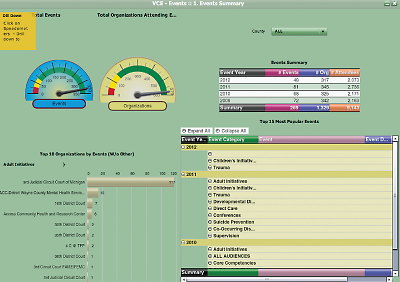The purview of the Detroit-Wayne County Community Mental Health Agency (D-WCCMHA) is not for the faint of heart.
It oversees all community mental health services in Wayne County, which run the gamut from child mental health care and wraparound services to suicide-prevention efforts and training for individuals with autism. These services are made available through some 400 provider agencies, and the agencies in turn serve some 70,000 county residents yearly. The D-WCCMHA is the 11th- or 12th-largest county community mental health agency in the United States.
Thus it has the formidable task of making sure that the 14,000 individuals who work for the provider agencies are properly educated and trained. And toward this end, the agency’s medical director, Michele Reid, M.D., and some of her colleagues launched an online training Web site for these individuals six years ago.
Although other county community mental health agencies offer some online training, this Web site—called the virtual Center of excellence, or VCE—appears to be particularly ambitious and far reaching.
Or as Reid, who is also on APA’s Council on Minority Mental Health and Health Disparities, said during an interview, “I believe that VCE is in the forefront, especially as it is fully engaging our entire workforce.”
And as one of the individuals who helped Reid get VCE up and running— Carol Oleksiak, M.S.W.—pointed out during an interview, “I was just in Washington, D.C., obtaining a federal grant for VCE, and people couldn’t believe what we’re doing. I get calls from other states asking, ‘How are you doing that?’ ”
Staff’s Education Varies Considerably
To appreciate the scope of what Reid, Oleksiak, and their colleagues have taken on, one needs to realize that not only do some 14,000 individuals provide mental health care to people in Wayne County, but that they vary considerably in their educational backgrounds. There are direct-care workers with high school diplomas; case managers with bachelor’s degrees in human services, primarily social work; therapists who have master’s degrees in counseling or social work; and nurses, psychologists, and psychiatrists.
So when Reid and her team piloted VCE in May 2007, they chose a training course that everyone in the system would have to take, and they put it online. During the first month of the course, about 7,000 staff members signed up for it.
After that, with the help of Eastern Michigan University, Wayne State University, a community college, care providers, consumers, family members, and advocates, they added other courses to VCE that were geared to the needs of individual staff members and clinicians. For instance, they set up courses for infant mental health workers, a course to help supervisors learn how to retain their staff, and continuing-education courses for social workers. “We were able to meet the needs of some 6,000 social workers for their training,” Reid said.
Today, virtually all staff members who work under the aegis of D-WCCMHA are registered with VCE and get all their required mental health training online.
VCE is even being used by psychiatrists who work with D-WCCMHA’s subcontractors. For example, “I’ve been using it ever since it’s gone up,” Mary Roberts, M.D., an assistant professor of psychiatry at Wayne State University and past president of the Michigan Psychiatric Society, said during an interview. “[Because I] interface with D-WCCMHA on a number of projects and issues… and see community mental health patients in the county, I have training requirements that I have to fulfill—say, HIPAA or infection control.… VCE is really valuable [for getting such training].”
Roberts also observed that Reid and her team “have been absolutely spot on in terms of developing it… because an increasing number of clinicians are utilizing online resources for training, for meeting different requirements, for continuing education.”
VCE Has Saved $1.6 Million
Moreover, VCE has saved $1.6 million in travel expenses and time away from the job to travel to comparable training sessions in southeastern Michigan. As Oleksiak explained it, “Let’s say I’m an outpatient therapist, and I have to take a course on Medicaid recipient rights—that is, on how to protect the rights of the Medicaid clients I am serving. If I have a client cancel, I can use that time to take the course online. I don’t have to leave my office, I don’t have to drive, I don’t lose work time.”
And as Reid noted, “They can do the courses at their desktops, on their iPads, or even on their iPhones.”
Furthermore, VCE has received $801,667 in grants, notably $500,000 from the U.S. Department of labor, to set up technology-based learning online and training in using computers for the direct-care staff.
Reid and her team even asked the technology experts who helped them design the VCE Web site to add a “dashboard” to it. That is a high-technology device at the end of the Web site that keeps track of all of the data and can be used for all sorts of purposes. “Let’s say that Dr. Reid needs to get a message to all the psychiatrists in the system,” Oleksiak explained. “Or she may want to find out who are all the community mental health nurses in Wayne County. Or individual agencies who work under D-WCCMHA can use the dashboard to learn which of their staff members took which courses. Such information can be important for auditing at the county, state, or federal level.”
Today, the VCE Web site offers courses not only for community mental health professionals in Wayne County, but also for those who use the services and for their family members, as well as for peer-support specialists and first responders who interact with the police, firefighters, or school teachers.
Information is also offered for the public, such as on suicide prevention. last year, the VCE Web site provided 241 credit and noncredit courses and was visited by 66,107 individuals.



